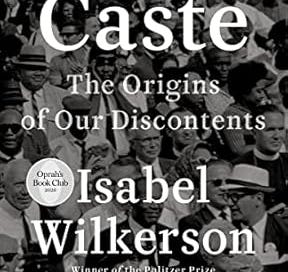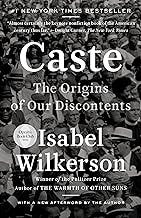Guerrilla Readers: April 2025
Introducing CASTE: The Origins of Our Discontents, by Isobel Wilkerson
To old friends, hello again and thank you for coming back for the fourth in our series of definitely-difficult books. I appreciate your commitment!
To new friends: In this group, we are reading writers who challenge what we think we knew about about the world we live in—books that push us toward new understandings of the world we inherited and the communities we have shaped. These are not escapist, fun-to-read books, and the reading is unsettling, disturbing, even (often) frightening. But they give us a map through unforgiving terrain in daunting weather—sometimes the fog is so thick we can’t see the person walking beside us. And it’s good to know that somebody recently made the dangerous trip through this daunting territory and left us some field notes so we can grope our way through the dark to the other side of whatever-this-is. So we read on, hopefully.
This post is a brief reader’s guide to Caste. Earlier posts and discussions in this same series are here. Free subscribers are welcome to read along with the posts; paid subscribers have access to additional resources and are welcome to join the discussion that will open on April 21.
Caste is insidious and therefore powerful because it is not hatred, it is not necessarily personal. It is the worn grooves of comforting routines and unthinking expectations, patterns of a social order that have been in place for so long
that it looks like the natural order of things.
—Isabel Wilkerson, Caste
This week begins our usual reading period. This is a complex, multilayered book, so I’ve compiled a brief outline with a few questions that might help you move through it.
Part One: Toxins in the Permafrost
Chapters 1–3
What does Wilkerson mean by “an old house”? How does this metaphor help us understand “structural injustice”?
What buried "toxins" have you—your family, your schools, your workplaces, your community—inherited from the past?
Part Two: The Construction of Caste
Chapters 4-9
In Prequel, we read about the connections between Nazi Germany and American laws. Wilkerson makes that connection even more hugely consequential than Maddow. How?
Caste is easier to see when it isn’t ours. Both Martin Luther King and Wilkerson went to India. What did they learn? Have you been in a situation where caste (yours or others) was suddenly apparent to you?
Part Three: The Eight Pillars of Caste
Wilkerson’s eight pillars (somewhat rephrased) are:
“divine” law, “natural order,” origin stories;
heritage: caste is inherited, fixed (class isn’t);
endogamy, who can marry whom, have children;
who’s clean, who’s “dirty”;
who gets to work where, for how much;
“othering”: stigmatism, dehumanization;
controlling behavior by terror, cruelty;
inherent superiority/inferiority.
Which pillars do you intuitively find most familiar? Why?
Which pillars are unfamiliar? Why?
Wilkerson writes: “If you can act your way out of it, then it is class, not caste.” Do you agree?
Do you see any examples of any of these pillars in recent political events, here or in other countries?
Part Four: The Tentacles of Caste
Chapters 10-18
Wilkerson uses personal and historical stories to show us how caste works. Which of these caught your attention? Surprised you? Made you squirm?
How do military service, sports, and education reinforce or challenge caste? Have any of these impacted you?
Part Five: The Consequences of Caste
Chapters 19-24
In the U.S., Wilkerson writes, there is “an expectation that an upper-caste person must assert superiority of knowledge and intellect in all things, having been socialized to be first and to be central, a pressure to be right and the need to remind the lower-caste person, subtly or not, of their historic, cultural, spatial, and familial inferiority.” Have you experienced this? In what context?
Part Six: Backlash
Chapters 25-29
What’s involved in backlash? Why? What instances of it are you seeing in our current situation?
What’s the role of silence, denial, or complicity in preserving caste systems? What evidences of it do you see in current events?
Part Seven: Awakening
Chapters 30-31 + Epilogue
What would it mean to live in a “world without caste”? How would that work? Is it possible? Why, why not?
What does Wilkerson’s story, “the heart is the last frontier,” suggest about personal transformation? Do you have a similar story?
Below, a few more questions and resources for readers who want to dig deeper and who plan to join our discussion (beginning April 21). You’ll also find a list of additional titles on this topic and an announcement of our May selection!
Keep reading with a 7-day free trial
Subscribe to Thyme, Place & Story to keep reading this post and get 7 days of free access to the full post archives.





